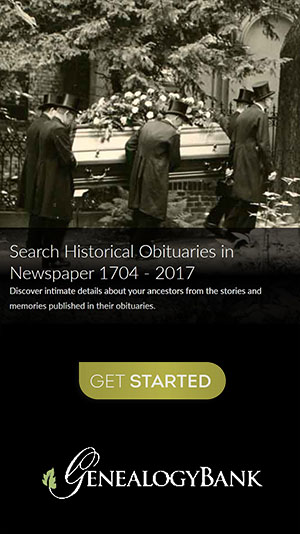Search Death Records (United States)
 U.S. Newspapers, 50 State Full Search (1690-present)
U.S. Newspapers, 50 State Full Search (1690-present) U.S. Obituary Database Search, (1696-present)
U.S. Obituary Database Search, (1696-present) U.S. Birth Announcements Database, (1700s-present)
U.S. Birth Announcements Database, (1700s-present)
Urban Sprawl Threatening Cemeteries
by Steve, Sunday, February 19, 2006
Asher Price writes
an article in the Austin-American Statesman that small family
graveyards, once surrounded by acres of privately owned land,
now find themselves buried under the subdivisions and roadways
of sprawling communities.
It's an issue that has played itself out thousands of times over, in all parts of the world. It's not so much that rising population forces the destruction of these graveyards, it's that after a hundred years, the great-great-grandchildren are unaware their ancestors are being buried under yet again.
This is perhaps why researching one's family history becomes important. It takes a forgotten name, and turns it into a familiar person again. After studying the documents and records of an ancestor, one begins to understand the legacy that he or she has inherited, and it's at that point where sentimental value is placed on such things as an old graveyard.
It's the responsibility of parents, grandparents, aunts and uncles to be the keepers of the family history and recite the stories and anecdotes at the dining table or around the campfire, and foster a sense of pride into the minds of their younger kin.
I also want to point out that another way to save cemeteries, if not physically, is to preserve their records. Store them in books, or store them on microfilm, or store them online. The more copies of these records that get created, the more likely they'll survive through the ages.
For the past several years now, those of us here at Interment.net have been proud to provide a place on the Internet where thousands of cemeteries can live on forever, waiting for a great-great-grandchild to rediscover them. And we plan to relish in that pride for many more years to come.
If you've thought about transcribing the records of a cemetery near you, I encourage you to do so. Read our article on Recording a Cemetery. If you like, publish it here on Interment.net, but just get it published somewhere so that people have the opportunity to use it.
It's an issue that has played itself out thousands of times over, in all parts of the world. It's not so much that rising population forces the destruction of these graveyards, it's that after a hundred years, the great-great-grandchildren are unaware their ancestors are being buried under yet again.
This is perhaps why researching one's family history becomes important. It takes a forgotten name, and turns it into a familiar person again. After studying the documents and records of an ancestor, one begins to understand the legacy that he or she has inherited, and it's at that point where sentimental value is placed on such things as an old graveyard.
It's the responsibility of parents, grandparents, aunts and uncles to be the keepers of the family history and recite the stories and anecdotes at the dining table or around the campfire, and foster a sense of pride into the minds of their younger kin.
I also want to point out that another way to save cemeteries, if not physically, is to preserve their records. Store them in books, or store them on microfilm, or store them online. The more copies of these records that get created, the more likely they'll survive through the ages.
For the past several years now, those of us here at Interment.net have been proud to provide a place on the Internet where thousands of cemeteries can live on forever, waiting for a great-great-grandchild to rediscover them. And we plan to relish in that pride for many more years to come.
If you've thought about transcribing the records of a cemetery near you, I encourage you to do so. Read our article on Recording a Cemetery. If you like, publish it here on Interment.net, but just get it published somewhere so that people have the opportunity to use it.
Search Cemetery Column
Search Burial Records
Submit a Transcription
Help genealogists worldwide research their family history!
- No cost to publish your transcription- You retain all rights to your work
- No one can edit, change, or delete your work

